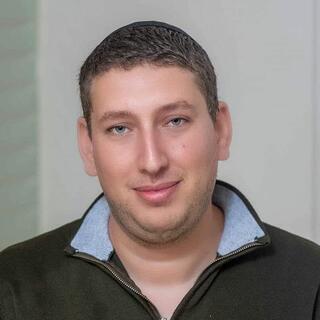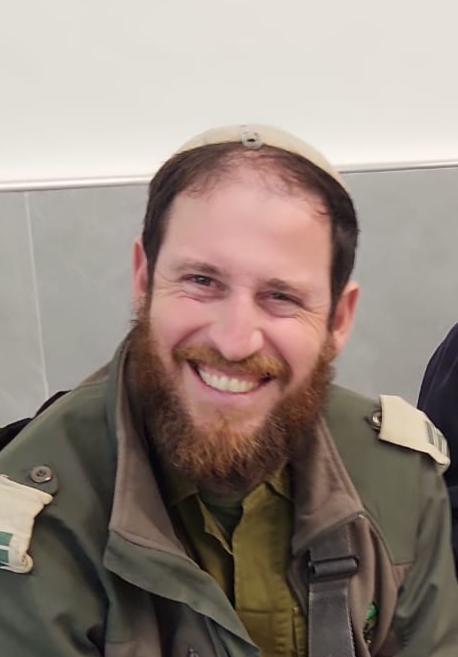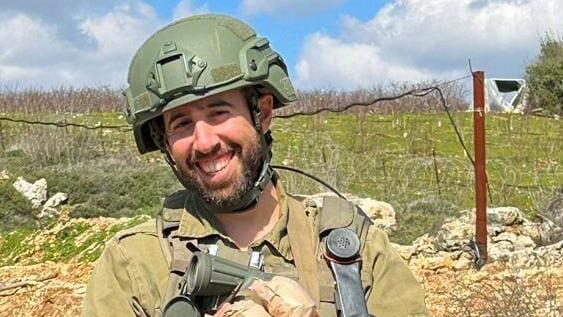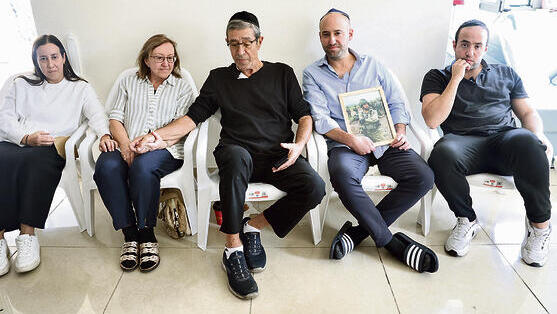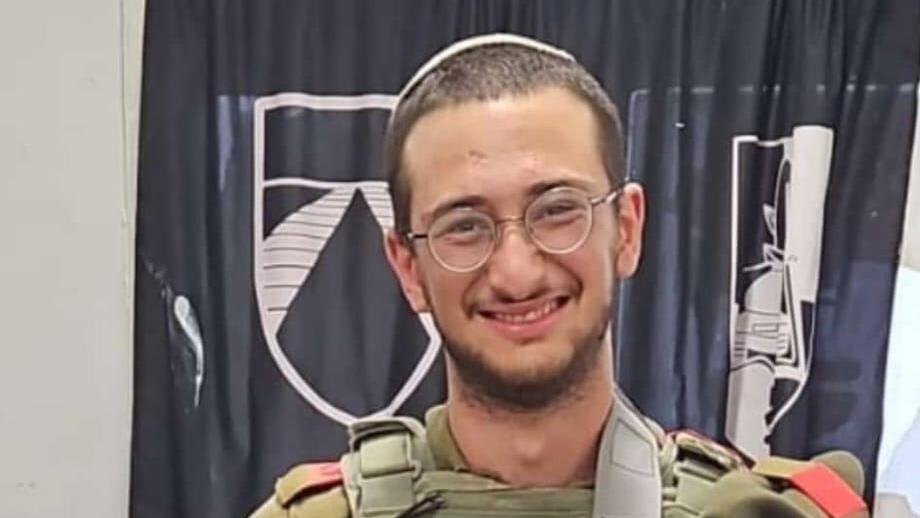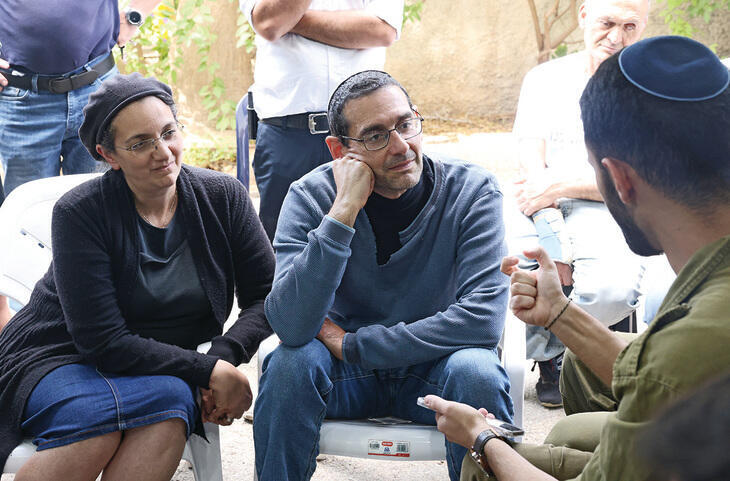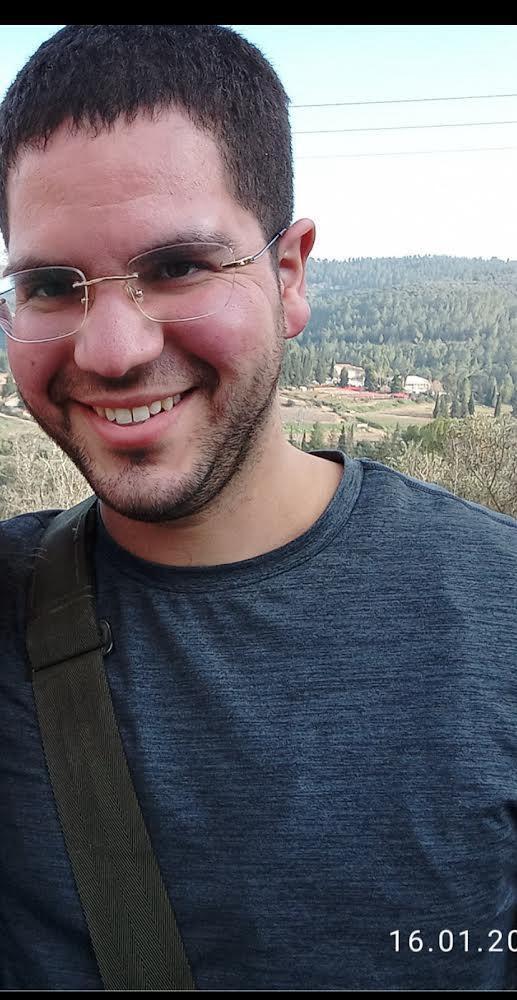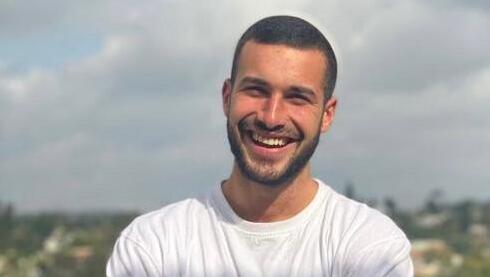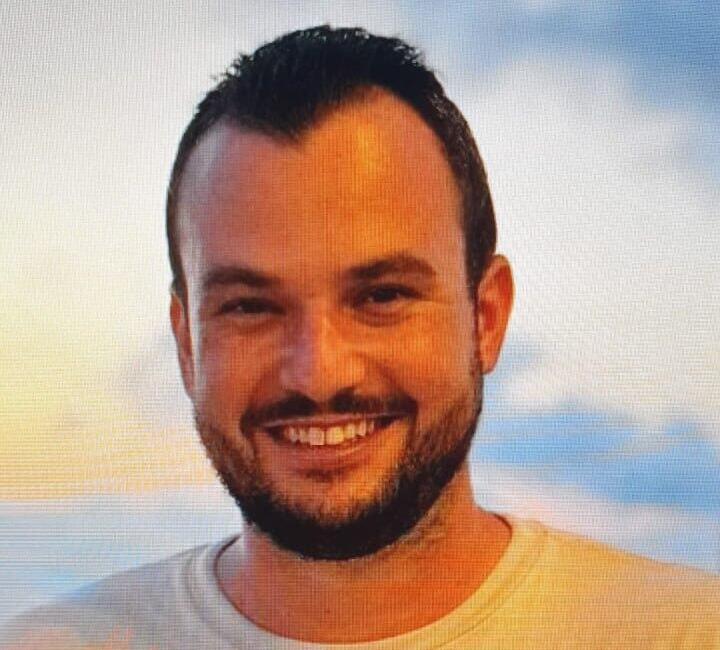Getting your Trinity Audio player ready...
The homes of families mourning their loved ones killed in the war are easy to find. Buildings draped in Israeli flags with condolence notices at the entrance have become part of the landscape. Dozens of bereaved families across the country are sitting shiva, a number of them in Jerusalem are located just minutes from each other.
Captain (res.) Rabbi Avraham Yosef Goldberg
A mourning tent has been set up near the home of Rabbi Avraham Yosef Goldberg, who was killed in a battle in southern Lebanon. Rows of Israeli flags guide visitors there, paying respects to the deceased and marking the way.
As in his life, Captain (res.) Goldberg's mourning tent is filled with a diverse crowd of people. High school students alongside older adults and female soldiers mingling among ultra-Orthodox men, all share in the painful space. One by one, the mourners shared reflections of him: a devoted educator, a gifted musician, a soldier who never missed a day of service and a cantor during the Jewish High Holidays.
He was a kollel head, rabbi, teacher, father — a world. “It’s just so him,” said his widow, Rachel, when visitors from Kibbutz Ginosar described his usual leading of Yom Kippur prayers in their kibbutz, sharing a voice message he sent with a Rosh Hashanah blessing after being unable to join them in the past holiday. “That’s exactly who he was — he cared about everyone with all his heart.”
Rabbi Goldberg left his eight children behind. “Our father lived a life for the nation,” said his eldest son, Yehuda. “His life was dedicated to the people of Israel, without ever considering what would be most comfortable for him. Wherever Israel needed him, that’s where he wanted to be.”
Rabbi Goldberg, who fell at 43, continued serving in the reserves as both a soldier and military rabbi even after he was exempt. His absence was already felt over the past year — in his classroom, in the projects he led and most deeply, at home.
“This year prepared us to say goodbye,” Yehuda added. “He wasn’t home often, both with us and with his students. Both God and our father made us ready for it an advance.”
Warrant Officer (res.) Shmuel Harari
A short walk away, another building bears the same painful front. The parents, widow and three children of Warrant Officer (res.) Shmuel Harari, who fell in Lebanon, are gathered at the widow Anna’s parents' home.
Seventeen years ago, Shmuel made aliyah, enlisted in the IDF, started a family and stayed on for reserve duty. His parents and siblings have flown in from the United States to sit shiva with his wife, who lives in Safed and chose to mourn at her parents’ home in Jerusalem.
“He made aliyah at 17,” his brother Aivy said. “He finished high school and immediately came to spend a year in a yeshiva in Israel, after which he enlisted and stayed here. Our parents really wanted him to stay in the United States; our dad wanted him to go to university and earn a decent living, but it wasn’t even a consideration for him.”
Aivy shared that Shmuel “was very eager to come to Israel. For years before he finished high school, he said he would make aliyah. He was very Zionistic despite our parents’ worry. He got married and lived in Safed because that’s where his wife studied medicine and she relocated to Jerusalem during the height of the war while he spent most of the year in reserve duty.”
Last summer, the family gathered for what would become an unexpected farewell meeting. “He finished his reserve duty in the summer,” Aivy recounted. “We had a great time together; we were so happy to meet up. He delayed his return to work for a whole month to be with us and then, after the fighting began in Lebanon, he was called back. That’s how it ended.”
Sergeant Hillel Ovadia
Not far from there, a large mourning tent is also being set up beneath the family home of Sergeant Hillel Ovadia, filled with many mourners. Hillel, 22, who fell in Jabalia, was an Armored Corps soldier and a trainee in the tank commander course in the 196th Battalion, having graduated from the pre-military yeshiva in Brukhin.
One by one, friends from his yeshiva and the military entered the tent to share stories about the young man who was always cheerful. In the yeshiva, he would deeply engage in study for hours; when it rained, he would lead joyous dances outside and would set the tone for serious learning after returning to the study hall.
Sergeant Major (Res.) Gilad Elmalich
Far from there, in northern Jerusalem, the family of Sergeant Major (Res.) Gilad Elmalich, sits shiva. His parents, brother, widow and children gather to mourn. “Gilad wasn’t home much this year,” said his widow, Shir. “He knew he would be there whenever the Israeli people needed him. He never thought of backing down or asking not to participate in any of the missions.”
“It was about his connection to the Torah and the values he believed in so strongly,” she added. “Everyone felt he was their best friend. He felt a timeless connection to generations of the Jewish people, and always acted from that strength. He leaped into every mission. He volunteered with Holocaust survivors, always helping and all of it stemmed from his connection to the Torah.”
First Sergeant Yaakov Hillel
In Jerusalem’s Neve Yaakov neighborhood, among knitted kippahs and notices against conscription to the IDF on bulletin boards, shopping centers and yeshivas, sits the shiva for First Sergeant Yaakov Hillel, 21, a Golani Brigade soldier who fell in Lebanon.
Yaakov came from a Haredi family and there is a notable presence of yeshiva students and rabbis at the shiva at his home, along with his friends and military commanders. His father, Rabbi Chaim Hillel, a well-known educator in the Haredi community, sees no contradiction between his son’s life path and that of his other siblings and family members.
“It wasn’t a different path,” Rabbi Hillel says. “It was his own way. Yaakov was the third child among ten sons and daughters, all learning in Haredi frameworks. His brothers study in yeshiva,” the father said, “and he wanted to enlist. He wasn’t raised to do so, but that was his choice. He was a man of truth first and foremost; he paved a genuine path and when he saw what was right for him, he wasn’t concerned about what others would say. That turly characterized him.”
“One of the things that gives us the greatest comfort is that we always walked alongside him,” the father continued. “This was a path he forged with difficulty and effort, due to the different background he had compared to most soldiers. He was filled with a sense of mission and we were always by his side.”
Captain (res.) Alon Safrai
The family of Captain (res.) Alon Safrai, a Jerusalem resident, is also sitting shiva nearby. Safrai, 28, was a medical student — and wasn’t obligated to serve in the reserves. “Alon was a student for whom everything came so easily; he was a star, and everything just flowed for him,” his classmate wrote.
“We envied him because he could study for a few hours for an exam and still get good grades without too much effort. Everyone loved him. He was such a friendly guy, so helpful and a good person. Of all people, he shouldn’t have had to go,” he added.
Get the Ynetnews app on your smartphone:



